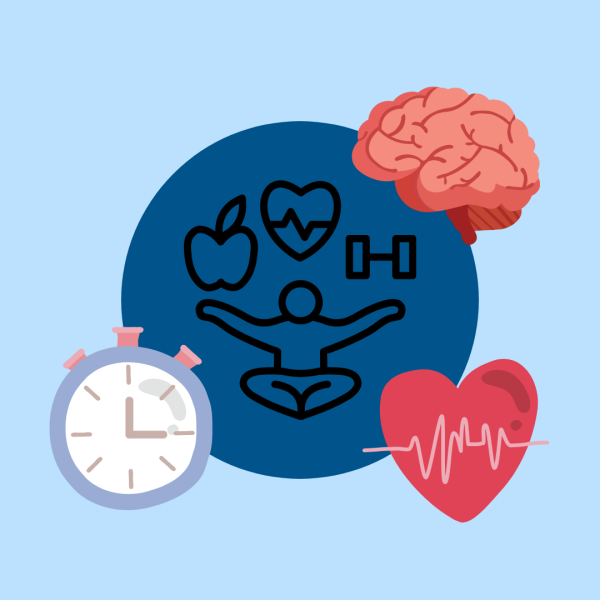
For those struggling with mental health, getting up and exercising can often feel like a chore; it may be the last thing they want to do. However, much research and personal experience proves that exercise can positively affect mental health once started. It is important to consider different types and intensities of exercise to ensure that almost anyone can find what works best for them. Whether it be yoga, a walk in the park with your dog, weight lifting, or a bike ride to work, many find stress relief and improved confidence, mood, and cognition when they do some form of exercise. The fitness world should begin to emphasize the mental health benefits of exercise, rather than solely focus on the visible physical health benefits.
According to the World Health Organization, depression is the primary cause of disability worldwide and a significant contributor to global illness. The National Center for Health Statistics reported in a study from 2009-2012 that only 35% of depressed individuals seek therapy; this could be attributed to a lack of funding, a shortage of qualified medical professionals, or even stigma surrounding depression. Frequent exercise may be an essential component of the management and therapy for those with “less severe forms of mental illness, such as depression and anxiety,” according to the National Library of Medicine. They state that physical activity and exercise may have an impact on depression symptoms that is on par with or better than that of conventional antidepressants. In addition, according to the Centers for Disease Control and Prevention (CDC), frequent exercise can prolong life, improve quality of sleep and mood, and lower chances of developing several common cancers. Nevertheless, studies linking physical activity to a lower incidence of depression still must be thoroughly explored.
While exercise can help with the relief of stressors and symptoms of depression, it can also improve sleep and mental cognition. The idea of exercising to aid not only your body but also your mind may feel overwhelming, but you don’t need to be a fitness guru or pro athlete. No matter your age or fitness level, any amount of physical activity can help. A habit can be built in a couple of weeks or months; in my own experience, when I started to feel the initial stress relief and higher levels of mental cognition from working out, it felt easier to perform physical activity every day, and I began to look forward to it.
When it comes to staying consistent, you do not have to be confined to one kind of activity; simply putting on your favorite music and dancing can provide the mental clarity and energy you need to get through the rest of the day. Even simply being intentional about adding activity to your routine, like walking a bit further than usual, can aid in reaping the benefits of physical activity.
At the same time, athletes may face mental health issues as they manage challenges while performing at top levels. Research shows that a variety of elite athletes report a mental health disorder, and the numbers are even higher for college athletes, according to the International Olympic Committee. This is where sports psychology can come into play, a field focused on understanding and improving the mental factors that influence athletic performance, well-being, and participation in sports. Sports psychologists tend to draw broadly from psychology research to further the connection between mental health and sports performance.
In order to understand the vital piece that mental health plays in athletic success, experts like Eliott Waksman, the director of Portland Sport Psychology, have dedicated their careers to preparing student-athletes with the tools they require to be successful on as well as off their field. Portland Sport Psychology offers a variety of tools to student-athletes, specifically students in the Portland area, with the hope of improving both performance and well-being. Waksman was first introduced to sports psychology as a college student at the University of Arizona, and recalls “sitting in the classroom thinking how interesting and valuable [it] was.” In his role at Portland Sports Psychology, he provides a workbook, individual sessions, team workshops, and even parenting workshops.
Orangetheory fitness coach and personal trainer Katie Dubs helps others discover the many benefits of fitness and mental health through building support and trust. She explains, “Watching clients light up as they discover their balance and growth is a precious reward to experience.” Dubs emphasizes the importance of finding moments of peace amidst the constant demands of life, which she achieves through fitness and relaxation. She highlights that the most profound mental health benefit she has experienced is the ability to “calm down and persevere in self-efficacy during very intense and strenuous situations.” Similarly, Waksman underscores the value of mindfulness practices, stating, “One of my favorite benefits of mindfulness practices and meditation is improved self-awareness … If we don’t have that awareness, we can push too much, leading to injury.” Balancing fitness with other commitments, such as work or school, requires intentional planning. Dubs agrees, noting that she manages her responsibilities by practicing “patience, speaking up for [herself], and keeping a detailed calendar.” This organized method allows her to prioritize physical activities while maintaining control of her schedule. Both of these perspectives stress how fitness, mindfulness, and organization can work together to improve overall mental health and well-being.
A cross-sectional study published in the Lancet Psychiatry examined survey results from 2011, 2013, and 2015, and revealed that individuals experience an average of 3.4 poor mental health days per month. After analyzing the findings, researchers determined that engaging in three to five 45-minute exercise sessions per week provided the greatest mental health benefits. The most notable positive impacts were showcased by team sports, cycling, aerobic routines, and gym workouts. Even less traditionally demanding tasks like household chores and childcare had a positive impact on mental health. Along with this, mindfulness-oriented activities like yoga and tai chi, while less physically intense, were shown to provide greater mental health benefits than walking. This highlights the significance of intentional movement and mental concentration in enhancing overall well-being.
These findings are demonstrated by real-world experiences, as professionals like Waksman have witnessed the significant advantages of exercise firsthand. In Waksman’s experience, “Many of [his] student-athlete clients have reported over the years how regular exercise really curbs their unpleasant symptoms of depression and anxiety.” This emphasizes the role of physical activity as a practical and accessible means of addressing mental health challenges, providing benefits that go beyond the gym or playing field. Whether alleviating stress, enhancing mood, or improving focus, physical activity demonstrably enhances both mental and emotional well-being. The relationship between exercise and mental health serves as a reminder that even small steps in day-to-day schedules can result in significant improvements to an individual’s enjoyment of life.
From my experience and research, maintaining discipline and making time for exercise can be challenging, but the benefits make it worthwhile. On a given day, I might want to work out with weights at the gym, and on another, I might prefer to take my dog for a walk in a local park. Regular exercise has dramatically improved my sense of mental clarity and enhanced my ability to concentrate. At the same time, it relieves my stress, leaving me rejuvenated and prepared for anything. When we focus primarily on the physical benefits of exercise and appearance, we can actually make it feel like even more of a chore. This is why it’s so important to choose a kind movement that brings joy, something that you will look forward to. Focusing on things like calorie counting and comparison can get in the way of the benefits that can be reaped from exercise by promoting unhealthy relationships with food and physical activity.
Don’t feel restricted, there is flexibility for people of all fitness levels, allowing for a variety of choices when it comes to exploring activities. As with most things, it will take time and effort, so don’t give up if you can’t find the ideal balance in your schedule or a favorite activity right away. The most crucial piece is staying positive and reminding yourself why you are doing it. Every step toward being active is a step towards improving your mental health. To see how exercise can improve not just physical health but also mental health, start small, stay consistent, and maintain an open and positive mind.


































